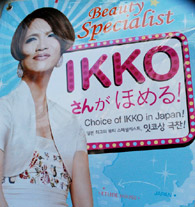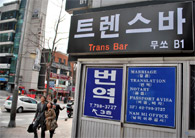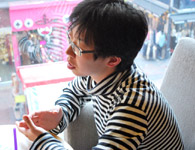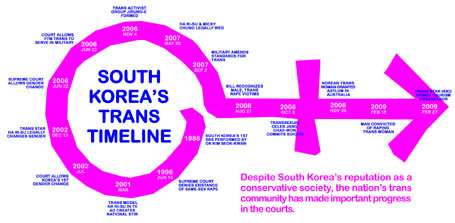Click here to view the enlarged version of the 'South Korea's trans timeline' graphic shown above.
At a press conference this past February, the Korea Tourism Organization (KTO) introduced Kazuyuki Toyoda as an honorary travel ambassador to Korea. The 47-year-old transgender "beauty management" guru is better known as "Ikko" in her native Japan.

The Japanese transgender make-up artist known as Ikko was recently named an honorary travel ambassador to Korea by the Korea Tourism Organization.
According to the Korea Times, Toyoda’s endorsement of "BB Cream," or blemish balm, precipitated a ten-fold sales increase of the product. Etude House, a Korean cosmetic chain selling the cream, signed her to an exclusive sponsorship contract. Additionally, the KTO is developing Ikko-themed travel projects.
Breakthroughs from the Bench
The choice of an openly transgender person to promote the nation's beauty and travel industries may seem an unlikely choice for conservative South Korea. Last year, Christian and business groups succeeded in removing protections for gays and lesbians from a federal anti-discrimination bill under review by lawmakers.
Although homosexuality is not a crime in South Korea, it is widely seen as taboo. Sixteen years after Korea's first LGBT organisation was founded, few rights are guaranteed for the nation's homosexuals. Last November, the Australian government's Refugee Review Tribunal granted a protection visa to a South Korean transwoman. The Tribunal accepted her claim that she would be persecuted if forced to return to Korea.
Despite the challenges, the nation's seongjeonhwanja, or transgender, population has won several court victories. In July 2002, a district court allowed South Korea's first legal gender change, when a 30-year-old woman named "Yoon" changed her sex from male to female. The court explained the ruling as respecting an individual's dignity and pursuit of happiness.
Four years later, a landmark judgment by the Supreme Court found that a 59-year-old female-to-male (FTM) transsexual could change his sex on his family registry. In its ruling, the Court said, "Gender should be decided by not only physical appearance but also the persons' mentality and psychology, and society’s attitude to that person."
The ruling, however, did not guarantee an individual's right to legally change their sex. Each petition is reviewed by a judge on a case-by-case evaluation of five criteria, which include: mandated counseling, sex reassignment surgery and that the person,
"…dresses like the changes [sic] sex, plays the role of the changed sex in individual areas and social areas including sexual relationships… and gets socially approved with the changed sex because it does not cause a serious change to the relations with other people or have negative effect on the society."
Trans activists' most recent victory occurred in February, when a district court convicted an 18-year-old man of raping a 58-year-old trans woman. Although South Korean law does not recognise that men can be raped, in his ruling, Judge Ko Jong-joo said the victim "acted like a woman since he was born," underwent SRS, and "lived with a male partner for a decade." He continued, "Given all of these, he can be seen as female."
The Court’s verdict was a reversal of a 1996 ruling, which refused to call the sexual assault of a trans woman "rape" because she had male chromosomes and was unable to become pregnant.
South Korea's "Hot Issue"
The recent court victories occurred in the wake of a popular 2001 Dodo Cosmetics television commercial. In the spot, the camera zooms in on the neck of a sexy woman to show an Adam's apple, suggesting her biologically male sex.
The model, born Lee Kyung-yup in a Seoul suburb in 1975, is better known as Ha Ri-su. Although the bump was added digitally (Ha doesn't have a prominent larynx), her appearance garnered significant public interest about transgender people in Korea.
"Harisu," a play on the English words, "hot issue," transitioned in adolescence and had sex reassignment surgery (SRS) in the late 1990s. After the television ad, Ha developed a successful career as a model, singer, author and trans advocate. In one of her first interviews, she told South Korea’s largest newspaper that she wanted to end bias against transsexuals.
In 2002, Ha became the second person to legally change their sex on South Korea's family registry. She also adopted a more feminine-sounding name. In 2007, Ha and her boyfriend Micky Chung were legally married in Seoul.
The man who officiated Ha and Chung's wedding was Dr Kim Seok-kwan. Dr Kim performed Ha's SRS, a procedure he pioneered in Korea in 1986. A facial and cranial plastic surgeon by training, Kim studied SRS in the United States after being approached by two men seeking the surgery. When he returned to Korea, a list of prospective patients had already formed by word-of-mouth referrals.
In a 2003 interview, Dr Kim told the New York Times that Ha Ri-su influenced the lives of his patients. "Ha Ri-su was of great benefit to social awareness of this issue. She has encouraged other transgender patients, who have always had trouble holding jobs; for most of them, living in secret, working in bars or as prostitutes was the only thing they could do."
The Seoul Scene

Several bars and sex clubs in Seoul's Itaewon neighborhood advertise as "trans" bars. Until recently, these venues provided some of the only employment opportunities for transgender and transsexual people in South Korea.
When 23-year-old Park Sung-hee told her family and friends about her female identity, they asked her if she was becoming a prostitute. Park says Korean societal prejudice compels most trans people to work in bars or clubs, "because they don’t have to worry about peoples' eyes and they can work whenever they want."
When her parents died, Park moved to Seoul and started an online shopping mall to earn money for her SRS. Although the Incheon-based designer has a successful career, she’s had to sever some family ties along the way. "I think making one’s family understand their [transgender] identity is the most difficult thing in the world," she says.

23-year-old Park Sung-hee
One considerable obstacle, however, is the national family registry system. Although the Korean language generally lacks gender-specific pronouns or titles, every citizen has a 13-digit identification number that indicates their sex. For men, the seventh digit is always 1. For women, it’s 2. The number is used on everything from legal documents to social networking Web sites. A number at odds with one's gender often creates awkward or humiliating situations, and can be a barrier to employment.
Trans Action
Another South Korean institution is military service for men age 20 and older. Previously, transgender people were not required to serve the approximately two-year commitment- MTF recruits were rejected on the grounds they were mentally ill, and FTM individuals were regarded as women.
Following the Supreme Court's 2006 decision, however, the Military Manpower Administration (MMA) adjusted its regulations. Now, individuals who legally change their sex to female are considered women, thus no longer required to serve. Conversely, legally male trans recruits are subject for duty.
The new policy has encountered problems. In 2007, the National Human Rights Commission of Korea (NHRCK) filed a report on behalf of a 29-year-old transsexual man named "Kim," who says he was humiliated during a routine military physical examination. Although the exam was deemed lawful, the NHRCK recommended, and the MMA agreed, to create new standards to accommodate transsexual conscripts.
Another advocacy group is the nation’s first trans-specific activist organisation. Jirung-e, which means "earthworm" in Korean, was founded in 2006. The word was chosen because worms are beneficial, though oft disliked and underground.

Lee Hyun is the 28-year-old co-founder of Jirung-e, South Korea's only trans activist organisation. Currently studying law in Seoul, Lee counsels trans plaintiffs for court cases. All photos and art by Matt Kelley.
A 2006 Korean Medical Association report estimates there are 4,500 transgender individuals living in South Korea. Lee says the lack of any trans-specific institution makes it difficult to know the community's size or its needs. Currently, Jirung-e's priorities are to address transphobia and to make SRS safer and more widely accessible in Korea. The six-member group is also developing a project to support incarcerated trans people.
Although segments of Korea’s legal, medical and academic establishments are becoming sympathetic to trans concerns, South Korea's powerful conservative Christian lobby is not. At the 2006 Supreme Court hearing, Rev Park Yeong-ryul of the Protestant Christian Academy for National Development argued, "God did not endow mankind with the right to choose sex," adding, "If we approve transsexuality, we should do the same for homosexuality. Many people have died from AIDS as a result of homosexuality."
A Nation in Transition
Since many of the challenges facing South Korea's trans population are not unique to the Korean Peninsula, Lee, of Jirung-e hopes that they can join an international effort. "I think it would be great if transgender people join in solidarity with each other… all over Asia to improve the systems together."
But Sel J. Hwahng, a visiting scholar at Columbia University's Center for the Study of Ethnicity and Race, writes via email, "[T]here cannot be a cohesive trans social or political movement in the US or internationally if many or most of the trans population are suffering negative mental health."
Hwahng, who is research investigator for the National Development and Research Institute's Transgender Project and on the board of the International Gay and Lesbian Human Rights Commission, says that trans communities may have higher rates of depression and suicidality than the general population.
Indeed, last October, one of South Korea's best-known transsexuals, Jang Chae-won, killed herself after battling depression. South Korea's high suicide rate has earned it the dubious moniker, the "republic of suicide."
Recalling Jang's death, Park, the designer, says it makes her sad thinking about the difficulty Jang faced as an openly-trans person in Korea. Yet Park advocates integration as a way to improve the social condition for Korean transgenders. "Many transgender people are out in society, so the range of people who have contact with them is growing. I think heterosexual people are becoming more comfortable having contact with transgender people."
Beyond comfort, Park seeks something more fundamental. "When I tell people that I’m transgender, they try to understand my inclination. But I don't want 'understanding.' I just want it to come naturally for them to accept me as a person." She pauses, smiles and then asks, "Do you think that wish can come true?"
Matt Kelley is a Seoul-based writer who typically writes about race, sexuality and/or travel. His website: www.mattkelley.info. Mike Lee is a student who also lives in Seoul.












 列印版本
列印版本












讀者回應
Thank you for the representation of Korean trans people on fridae. This was a great read!
FOLLOW THE MONEY! It's NOT about Korean lawmakers being PRO-trans or anti-GLBT.
Just about every one of my gay friends in Korea got married when he turned 30, proceeded to have two kids and then came right back out to the gay clubs once all that nonsense was over. You don't get anywhere in Korean society, especially the top of the corporate ladder, without getting married first. It is a very long way to the day when gay men in Korea are allowed to live their lives openly and honestly.
Of course the KTO and Etude House asked Ikko to sell their product because she's popular to the important Japanese customer base. Nevertheless, it's noteworthy in homophobic Korea.
I haven't seen evidence of the Korean government accommodating trans people, for pragmatism or any other reason. Rather, it's in reading the judiciary's compassionate (if sometimes awkwardly-worded) rulings that make me feel like they get the fundamental issue and things are improving on the LGBT rights front.
And sure, I've witnessed the "double life" scenario you mentioned, and agree that Korea (and most LGBT Koreans) have a long way to go before they "live their lives openly and honestly." But I'm happy to see many of the
請先登入再使用此功能。